Travel and Tourism: Legislation, Ethics, and Consumer Protection
VerifiedAdded on 2020/12/09
|15
|4277
|354
Report
AI Summary
This report provides a comprehensive overview of the legal and ethical frameworks governing the travel and tourism sector, with a specific focus on the operations of the TUI Group. It delves into various aspects of legislation, including surface, sea, and air transport laws, as well as contract law and consumer protection regulations. The report also examines the impacts of health, safety, and security principles on the industry, alongside a discussion of equality legislation and the ethical dilemmas faced by travel and tourism businesses. Furthermore, it explores key legislation related to health and safety, data protection, and discrimination. Overall, the report aims to provide a thorough understanding of the legal and ethical landscape within the travel and tourism sector.
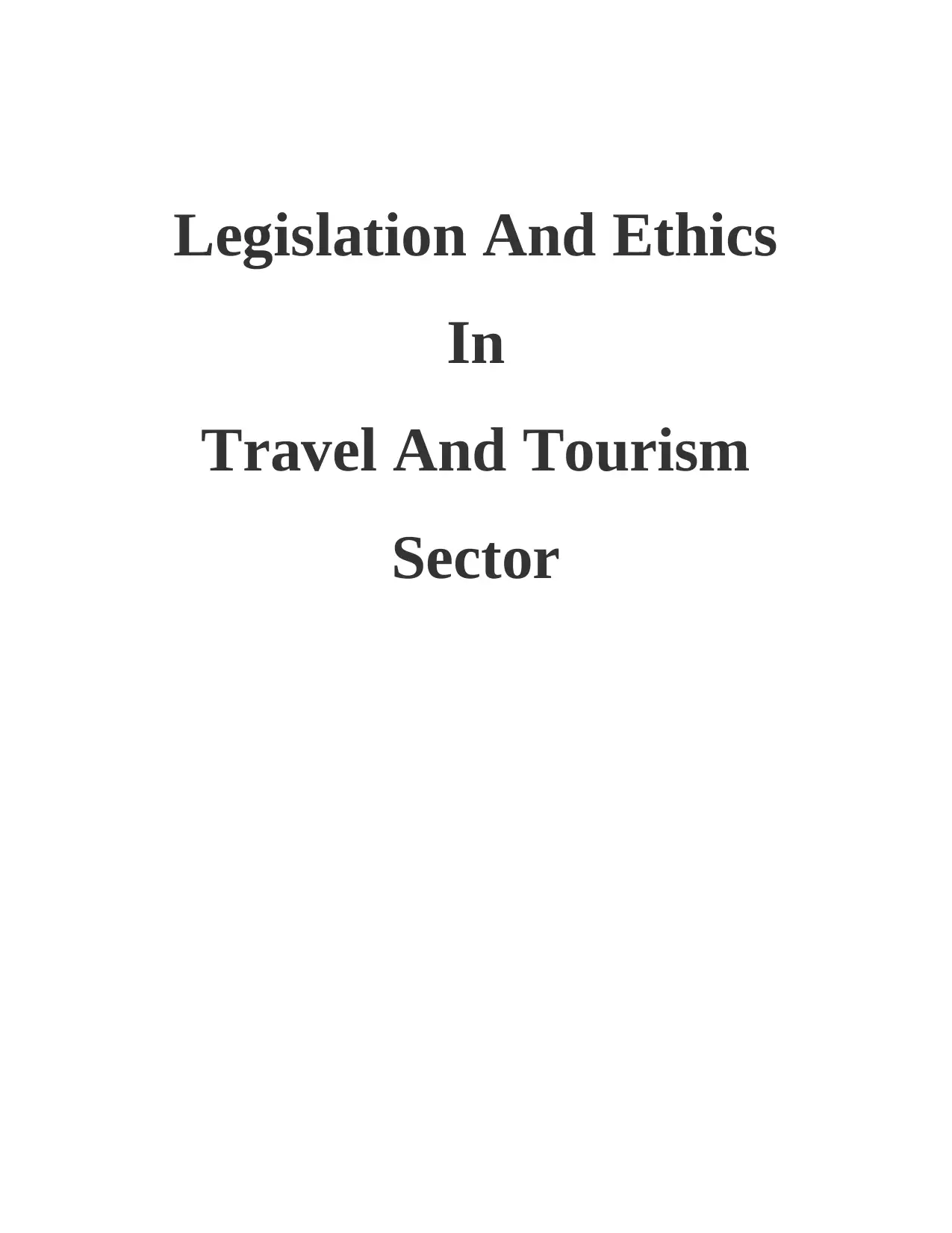
Legislation And Ethics
In
Travel And Tourism
Sector
In
Travel And Tourism
Sector
Paraphrase This Document
Need a fresh take? Get an instant paraphrase of this document with our AI Paraphraser

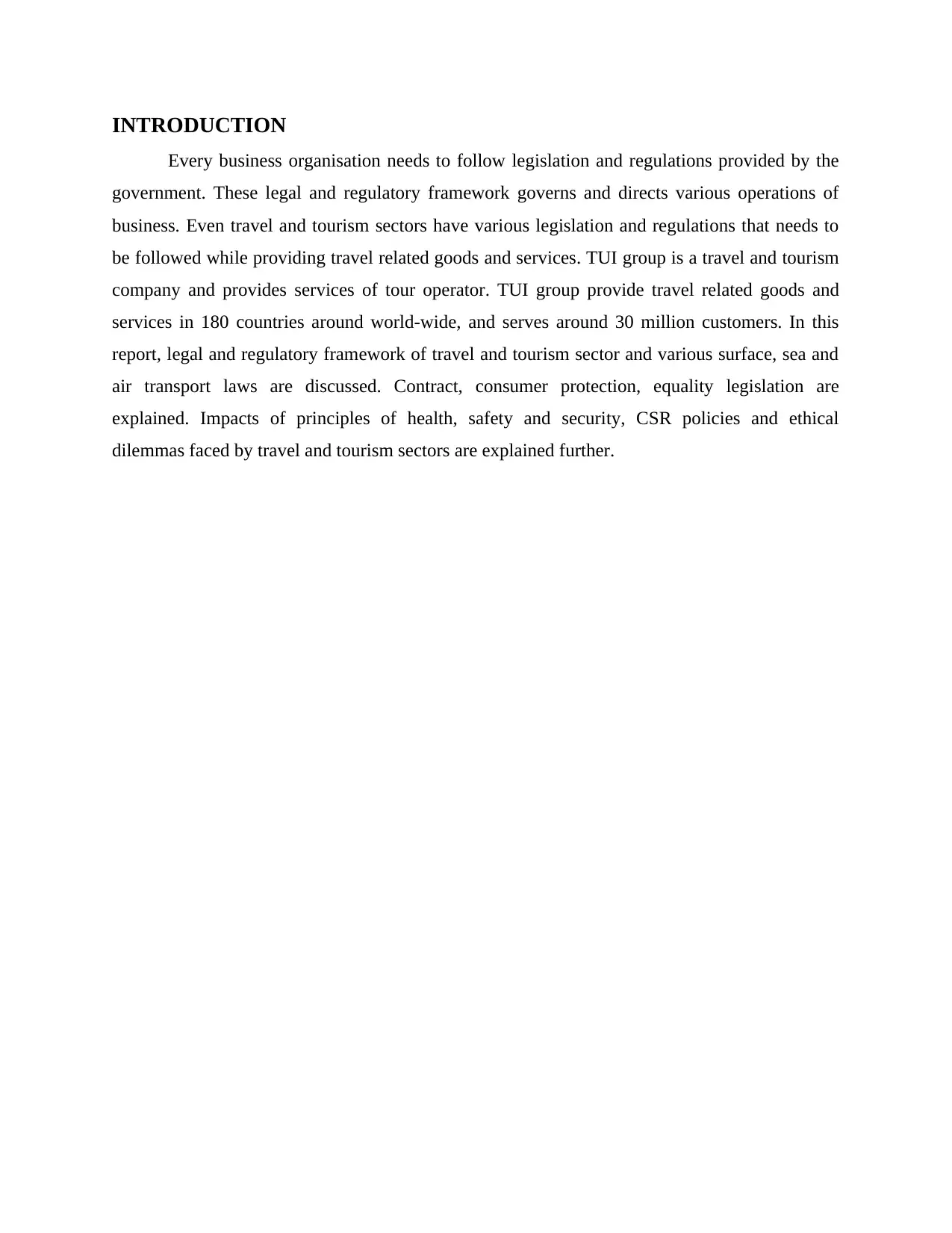
INTRODUCTION
Every business organisation needs to follow legislation and regulations provided by the
government. These legal and regulatory framework governs and directs various operations of
business. Even travel and tourism sectors have various legislation and regulations that needs to
be followed while providing travel related goods and services. TUI group is a travel and tourism
company and provides services of tour operator. TUI group provide travel related goods and
services in 180 countries around world-wide, and serves around 30 million customers. In this
report, legal and regulatory framework of travel and tourism sector and various surface, sea and
air transport laws are discussed. Contract, consumer protection, equality legislation are
explained. Impacts of principles of health, safety and security, CSR policies and ethical
dilemmas faced by travel and tourism sectors are explained further.
Every business organisation needs to follow legislation and regulations provided by the
government. These legal and regulatory framework governs and directs various operations of
business. Even travel and tourism sectors have various legislation and regulations that needs to
be followed while providing travel related goods and services. TUI group is a travel and tourism
company and provides services of tour operator. TUI group provide travel related goods and
services in 180 countries around world-wide, and serves around 30 million customers. In this
report, legal and regulatory framework of travel and tourism sector and various surface, sea and
air transport laws are discussed. Contract, consumer protection, equality legislation are
explained. Impacts of principles of health, safety and security, CSR policies and ethical
dilemmas faced by travel and tourism sectors are explained further.
⊘ This is a preview!⊘
Do you want full access?
Subscribe today to unlock all pages.

Trusted by 1+ million students worldwide
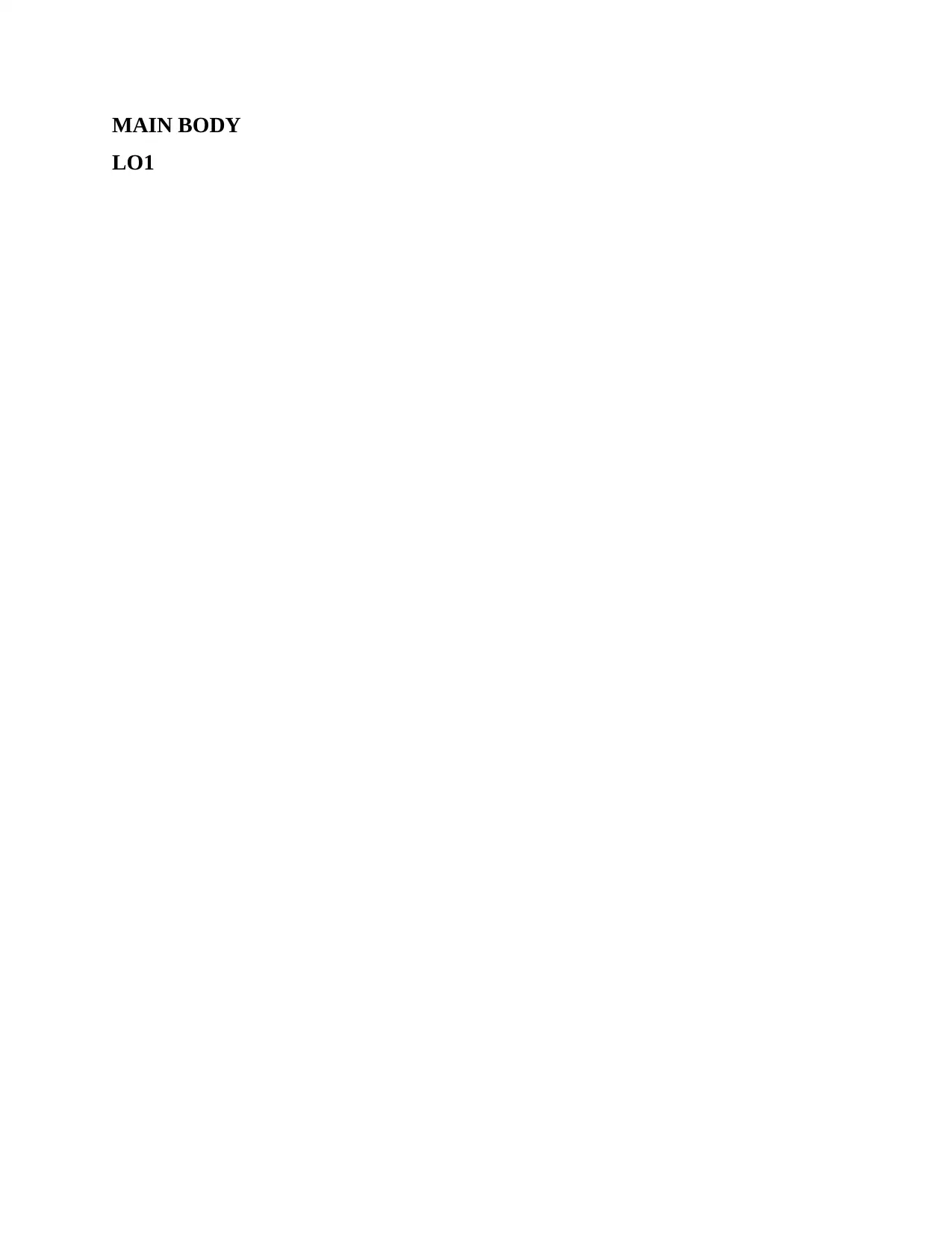
MAIN BODY
LO1
LO1
Paraphrase This Document
Need a fresh take? Get an instant paraphrase of this document with our AI Paraphraser
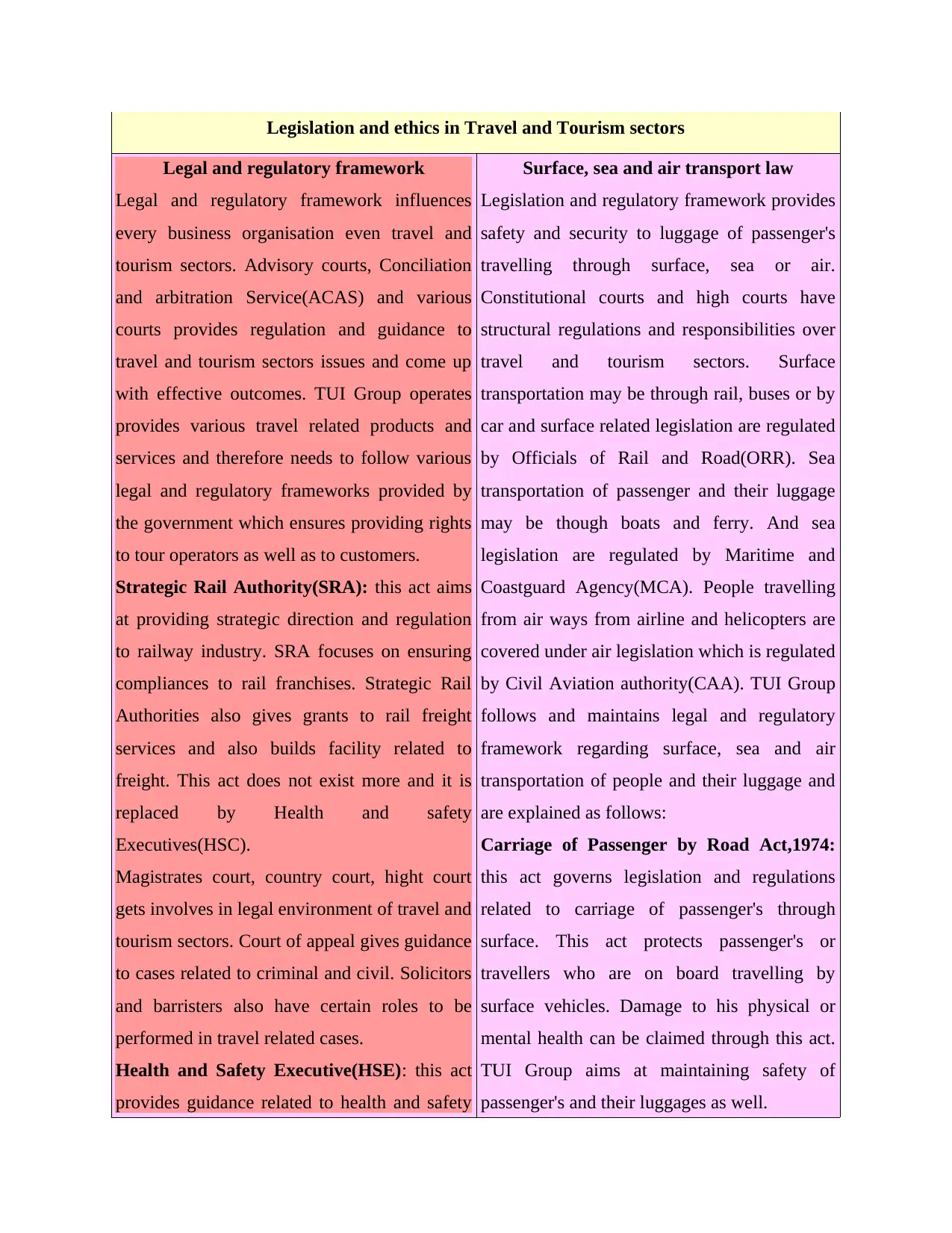
Legislation and ethics in Travel and Tourism sectors
Legal and regulatory framework
Legal and regulatory framework influences
every business organisation even travel and
tourism sectors. Advisory courts, Conciliation
and arbitration Service(ACAS) and various
courts provides regulation and guidance to
travel and tourism sectors issues and come up
with effective outcomes. TUI Group operates
provides various travel related products and
services and therefore needs to follow various
legal and regulatory frameworks provided by
the government which ensures providing rights
to tour operators as well as to customers.
Strategic Rail Authority(SRA): this act aims
at providing strategic direction and regulation
to railway industry. SRA focuses on ensuring
compliances to rail franchises. Strategic Rail
Authorities also gives grants to rail freight
services and also builds facility related to
freight. This act does not exist more and it is
replaced by Health and safety
Executives(HSC).
Magistrates court, country court, hight court
gets involves in legal environment of travel and
tourism sectors. Court of appeal gives guidance
to cases related to criminal and civil. Solicitors
and barristers also have certain roles to be
performed in travel related cases.
Health and Safety Executive(HSE): this act
provides guidance related to health and safety
Surface, sea and air transport law
Legislation and regulatory framework provides
safety and security to luggage of passenger's
travelling through surface, sea or air.
Constitutional courts and high courts have
structural regulations and responsibilities over
travel and tourism sectors. Surface
transportation may be through rail, buses or by
car and surface related legislation are regulated
by Officials of Rail and Road(ORR). Sea
transportation of passenger and their luggage
may be though boats and ferry. And sea
legislation are regulated by Maritime and
Coastguard Agency(MCA). People travelling
from air ways from airline and helicopters are
covered under air legislation which is regulated
by Civil Aviation authority(CAA). TUI Group
follows and maintains legal and regulatory
framework regarding surface, sea and air
transportation of people and their luggage and
are explained as follows:
Carriage of Passenger by Road Act,1974:
this act governs legislation and regulations
related to carriage of passenger's through
surface. This act protects passenger's or
travellers who are on board travelling by
surface vehicles. Damage to his physical or
mental health can be claimed through this act.
TUI Group aims at maintaining safety of
passenger's and their luggages as well.
Legal and regulatory framework
Legal and regulatory framework influences
every business organisation even travel and
tourism sectors. Advisory courts, Conciliation
and arbitration Service(ACAS) and various
courts provides regulation and guidance to
travel and tourism sectors issues and come up
with effective outcomes. TUI Group operates
provides various travel related products and
services and therefore needs to follow various
legal and regulatory frameworks provided by
the government which ensures providing rights
to tour operators as well as to customers.
Strategic Rail Authority(SRA): this act aims
at providing strategic direction and regulation
to railway industry. SRA focuses on ensuring
compliances to rail franchises. Strategic Rail
Authorities also gives grants to rail freight
services and also builds facility related to
freight. This act does not exist more and it is
replaced by Health and safety
Executives(HSC).
Magistrates court, country court, hight court
gets involves in legal environment of travel and
tourism sectors. Court of appeal gives guidance
to cases related to criminal and civil. Solicitors
and barristers also have certain roles to be
performed in travel related cases.
Health and Safety Executive(HSE): this act
provides guidance related to health and safety
Surface, sea and air transport law
Legislation and regulatory framework provides
safety and security to luggage of passenger's
travelling through surface, sea or air.
Constitutional courts and high courts have
structural regulations and responsibilities over
travel and tourism sectors. Surface
transportation may be through rail, buses or by
car and surface related legislation are regulated
by Officials of Rail and Road(ORR). Sea
transportation of passenger and their luggage
may be though boats and ferry. And sea
legislation are regulated by Maritime and
Coastguard Agency(MCA). People travelling
from air ways from airline and helicopters are
covered under air legislation which is regulated
by Civil Aviation authority(CAA). TUI Group
follows and maintains legal and regulatory
framework regarding surface, sea and air
transportation of people and their luggage and
are explained as follows:
Carriage of Passenger by Road Act,1974:
this act governs legislation and regulations
related to carriage of passenger's through
surface. This act protects passenger's or
travellers who are on board travelling by
surface vehicles. Damage to his physical or
mental health can be claimed through this act.
TUI Group aims at maintaining safety of
passenger's and their luggages as well.
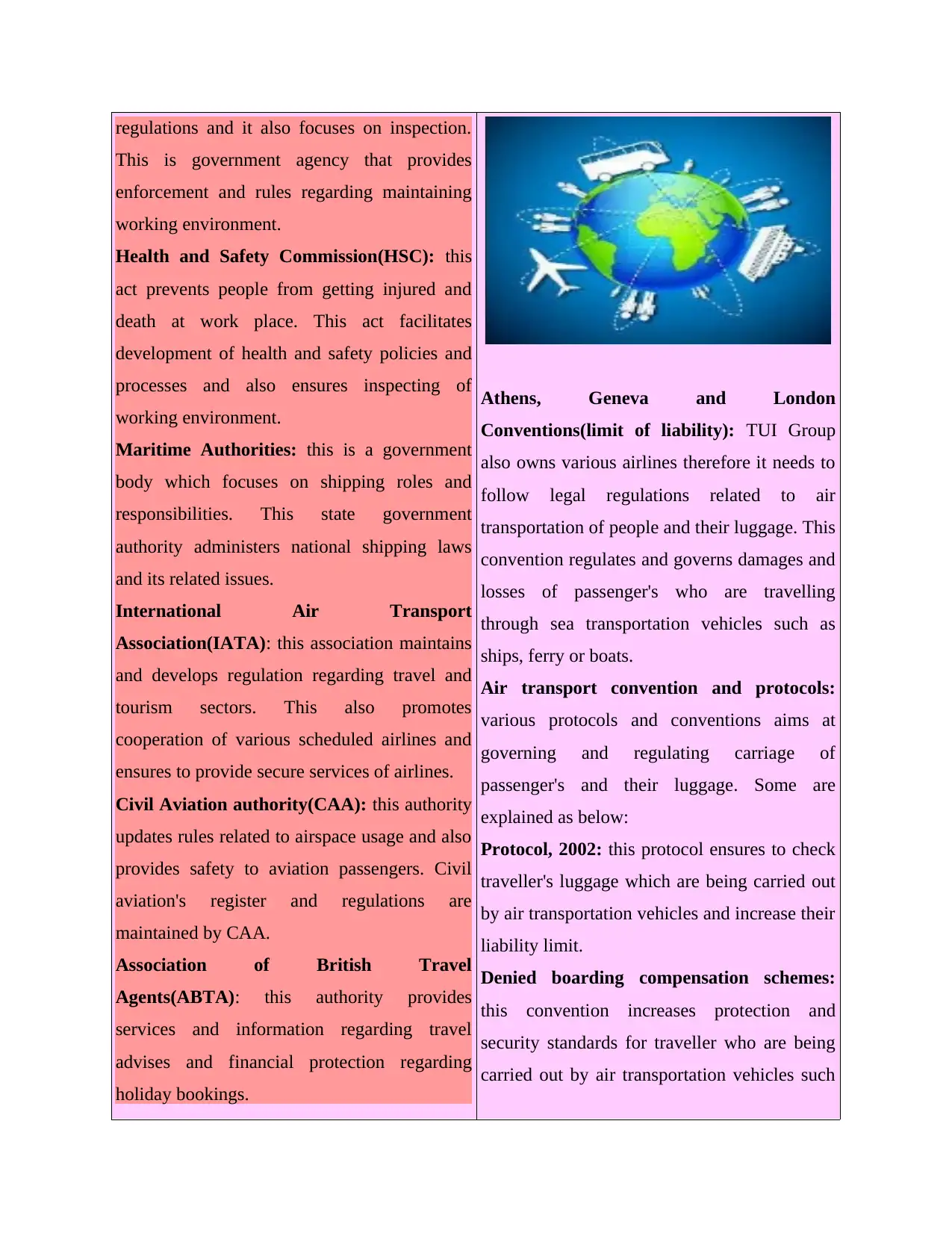
regulations and it also focuses on inspection.
This is government agency that provides
enforcement and rules regarding maintaining
working environment.
Health and Safety Commission(HSC): this
act prevents people from getting injured and
death at work place. This act facilitates
development of health and safety policies and
processes and also ensures inspecting of
working environment.
Maritime Authorities: this is a government
body which focuses on shipping roles and
responsibilities. This state government
authority administers national shipping laws
and its related issues.
International Air Transport
Association(IATA): this association maintains
and develops regulation regarding travel and
tourism sectors. This also promotes
cooperation of various scheduled airlines and
ensures to provide secure services of airlines.
Civil Aviation authority(CAA): this authority
updates rules related to airspace usage and also
provides safety to aviation passengers. Civil
aviation's register and regulations are
maintained by CAA.
Association of British Travel
Agents(ABTA): this authority provides
services and information regarding travel
advises and financial protection regarding
holiday bookings.
Athens, Geneva and London
Conventions(limit of liability): TUI Group
also owns various airlines therefore it needs to
follow legal regulations related to air
transportation of people and their luggage. This
convention regulates and governs damages and
losses of passenger's who are travelling
through sea transportation vehicles such as
ships, ferry or boats.
Air transport convention and protocols:
various protocols and conventions aims at
governing and regulating carriage of
passenger's and their luggage. Some are
explained as below:
Protocol, 2002: this protocol ensures to check
traveller's luggage which are being carried out
by air transportation vehicles and increase their
liability limit.
Denied boarding compensation schemes:
this convention increases protection and
security standards for traveller who are being
carried out by air transportation vehicles such
This is government agency that provides
enforcement and rules regarding maintaining
working environment.
Health and Safety Commission(HSC): this
act prevents people from getting injured and
death at work place. This act facilitates
development of health and safety policies and
processes and also ensures inspecting of
working environment.
Maritime Authorities: this is a government
body which focuses on shipping roles and
responsibilities. This state government
authority administers national shipping laws
and its related issues.
International Air Transport
Association(IATA): this association maintains
and develops regulation regarding travel and
tourism sectors. This also promotes
cooperation of various scheduled airlines and
ensures to provide secure services of airlines.
Civil Aviation authority(CAA): this authority
updates rules related to airspace usage and also
provides safety to aviation passengers. Civil
aviation's register and regulations are
maintained by CAA.
Association of British Travel
Agents(ABTA): this authority provides
services and information regarding travel
advises and financial protection regarding
holiday bookings.
Athens, Geneva and London
Conventions(limit of liability): TUI Group
also owns various airlines therefore it needs to
follow legal regulations related to air
transportation of people and their luggage. This
convention regulates and governs damages and
losses of passenger's who are travelling
through sea transportation vehicles such as
ships, ferry or boats.
Air transport convention and protocols:
various protocols and conventions aims at
governing and regulating carriage of
passenger's and their luggage. Some are
explained as below:
Protocol, 2002: this protocol ensures to check
traveller's luggage which are being carried out
by air transportation vehicles and increase their
liability limit.
Denied boarding compensation schemes:
this convention increases protection and
security standards for traveller who are being
carried out by air transportation vehicles such
⊘ This is a preview!⊘
Do you want full access?
Subscribe today to unlock all pages.

Trusted by 1+ million students worldwide
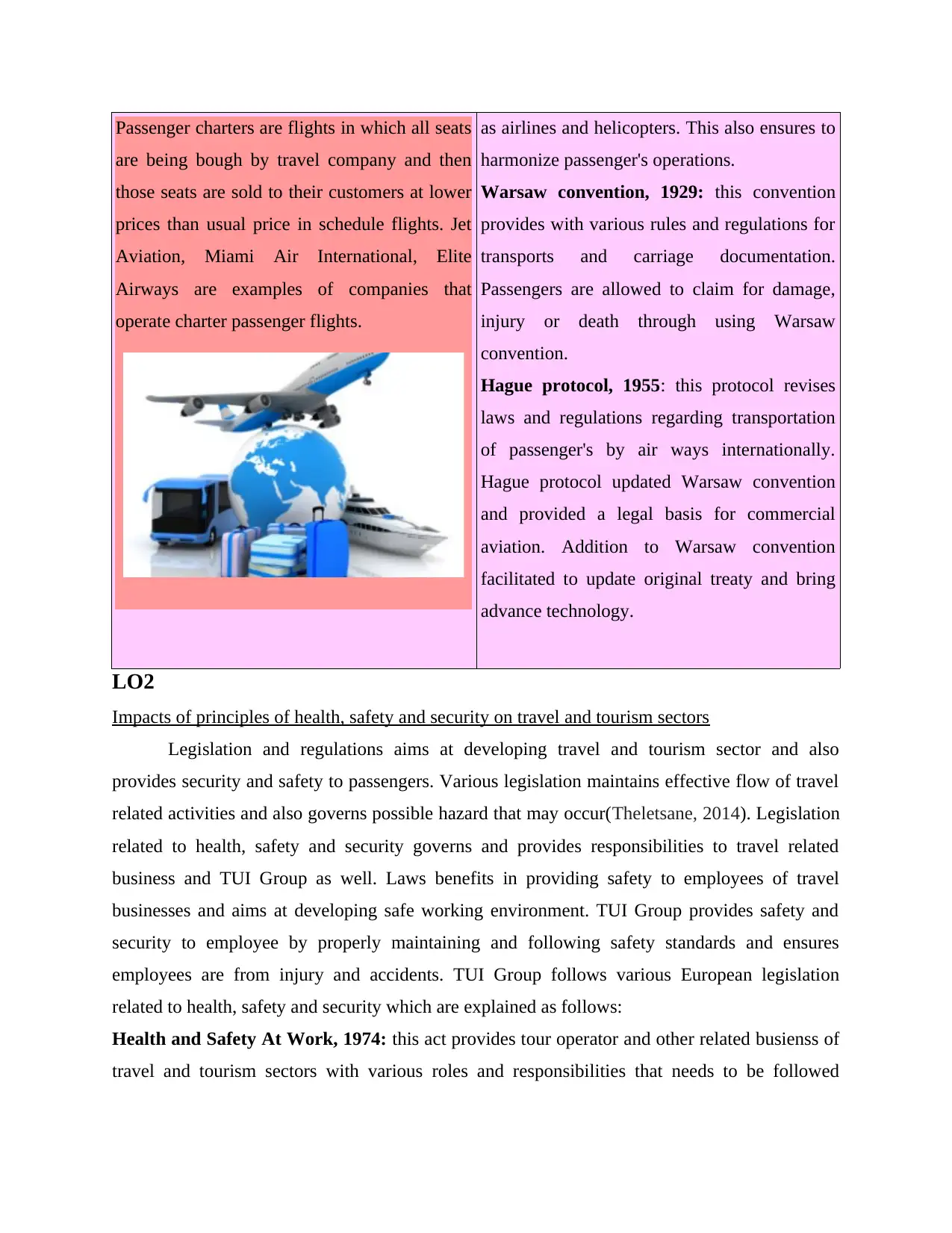
Passenger charters are flights in which all seats
are being bough by travel company and then
those seats are sold to their customers at lower
prices than usual price in schedule flights. Jet
Aviation, Miami Air International, Elite
Airways are examples of companies that
operate charter passenger flights.
as airlines and helicopters. This also ensures to
harmonize passenger's operations.
Warsaw convention, 1929: this convention
provides with various rules and regulations for
transports and carriage documentation.
Passengers are allowed to claim for damage,
injury or death through using Warsaw
convention.
Hague protocol, 1955: this protocol revises
laws and regulations regarding transportation
of passenger's by air ways internationally.
Hague protocol updated Warsaw convention
and provided a legal basis for commercial
aviation. Addition to Warsaw convention
facilitated to update original treaty and bring
advance technology.
LO2
Impacts of principles of health, safety and security on travel and tourism sectors
Legislation and regulations aims at developing travel and tourism sector and also
provides security and safety to passengers. Various legislation maintains effective flow of travel
related activities and also governs possible hazard that may occur(Theletsane, 2014). Legislation
related to health, safety and security governs and provides responsibilities to travel related
business and TUI Group as well. Laws benefits in providing safety to employees of travel
businesses and aims at developing safe working environment. TUI Group provides safety and
security to employee by properly maintaining and following safety standards and ensures
employees are from injury and accidents. TUI Group follows various European legislation
related to health, safety and security which are explained as follows:
Health and Safety At Work, 1974: this act provides tour operator and other related busienss of
travel and tourism sectors with various roles and responsibilities that needs to be followed
are being bough by travel company and then
those seats are sold to their customers at lower
prices than usual price in schedule flights. Jet
Aviation, Miami Air International, Elite
Airways are examples of companies that
operate charter passenger flights.
as airlines and helicopters. This also ensures to
harmonize passenger's operations.
Warsaw convention, 1929: this convention
provides with various rules and regulations for
transports and carriage documentation.
Passengers are allowed to claim for damage,
injury or death through using Warsaw
convention.
Hague protocol, 1955: this protocol revises
laws and regulations regarding transportation
of passenger's by air ways internationally.
Hague protocol updated Warsaw convention
and provided a legal basis for commercial
aviation. Addition to Warsaw convention
facilitated to update original treaty and bring
advance technology.
LO2
Impacts of principles of health, safety and security on travel and tourism sectors
Legislation and regulations aims at developing travel and tourism sector and also
provides security and safety to passengers. Various legislation maintains effective flow of travel
related activities and also governs possible hazard that may occur(Theletsane, 2014). Legislation
related to health, safety and security governs and provides responsibilities to travel related
business and TUI Group as well. Laws benefits in providing safety to employees of travel
businesses and aims at developing safe working environment. TUI Group provides safety and
security to employee by properly maintaining and following safety standards and ensures
employees are from injury and accidents. TUI Group follows various European legislation
related to health, safety and security which are explained as follows:
Health and Safety At Work, 1974: this act provides tour operator and other related busienss of
travel and tourism sectors with various roles and responsibilities that needs to be followed
Paraphrase This Document
Need a fresh take? Get an instant paraphrase of this document with our AI Paraphraser
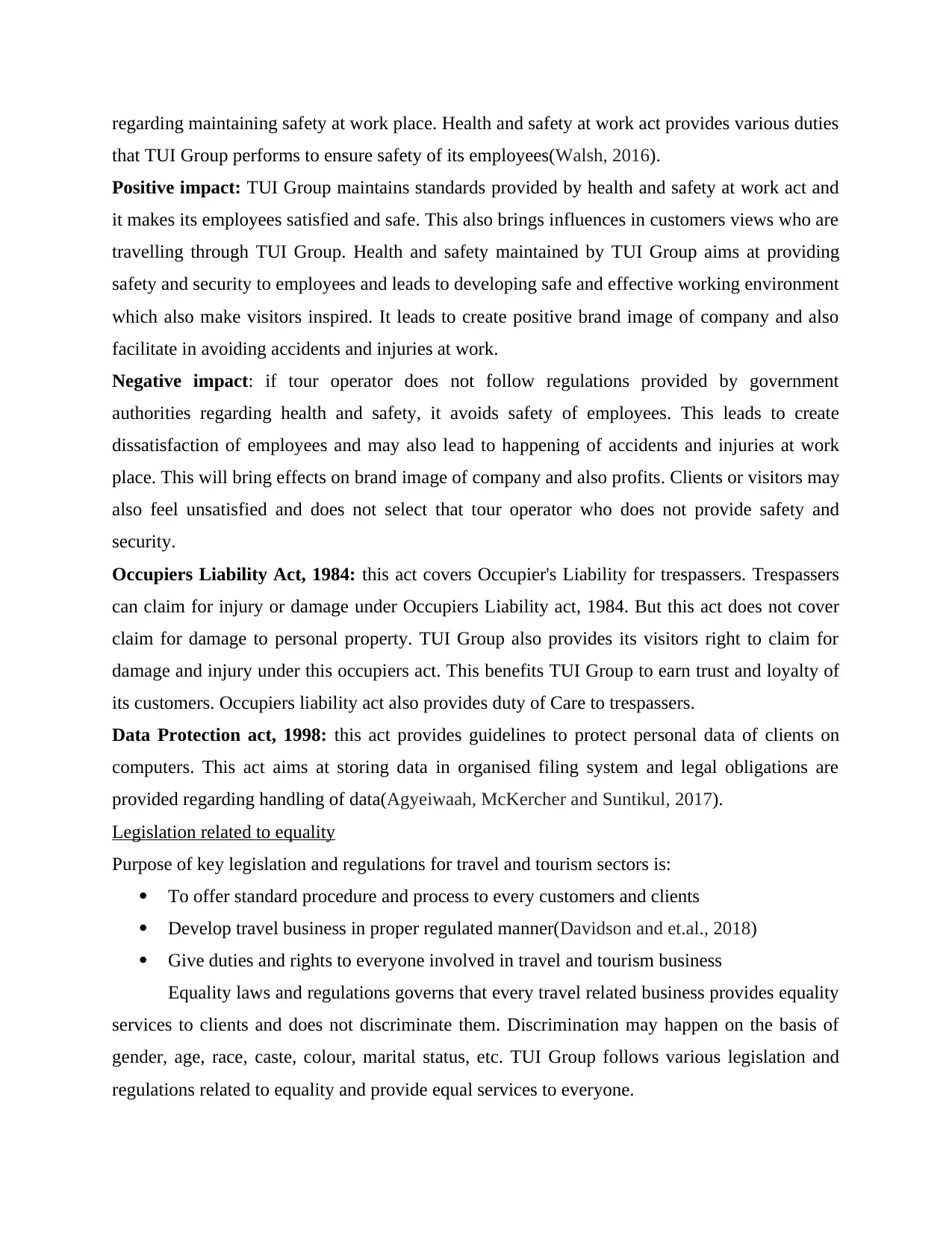
regarding maintaining safety at work place. Health and safety at work act provides various duties
that TUI Group performs to ensure safety of its employees(Walsh, 2016).
Positive impact: TUI Group maintains standards provided by health and safety at work act and
it makes its employees satisfied and safe. This also brings influences in customers views who are
travelling through TUI Group. Health and safety maintained by TUI Group aims at providing
safety and security to employees and leads to developing safe and effective working environment
which also make visitors inspired. It leads to create positive brand image of company and also
facilitate in avoiding accidents and injuries at work.
Negative impact: if tour operator does not follow regulations provided by government
authorities regarding health and safety, it avoids safety of employees. This leads to create
dissatisfaction of employees and may also lead to happening of accidents and injuries at work
place. This will bring effects on brand image of company and also profits. Clients or visitors may
also feel unsatisfied and does not select that tour operator who does not provide safety and
security.
Occupiers Liability Act, 1984: this act covers Occupier's Liability for trespassers. Trespassers
can claim for injury or damage under Occupiers Liability act, 1984. But this act does not cover
claim for damage to personal property. TUI Group also provides its visitors right to claim for
damage and injury under this occupiers act. This benefits TUI Group to earn trust and loyalty of
its customers. Occupiers liability act also provides duty of Care to trespassers.
Data Protection act, 1998: this act provides guidelines to protect personal data of clients on
computers. This act aims at storing data in organised filing system and legal obligations are
provided regarding handling of data(Agyeiwaah, McKercher and Suntikul, 2017).
Legislation related to equality
Purpose of key legislation and regulations for travel and tourism sectors is:
To offer standard procedure and process to every customers and clients
Develop travel business in proper regulated manner(Davidson and et.al., 2018)
Give duties and rights to everyone involved in travel and tourism business
Equality laws and regulations governs that every travel related business provides equality
services to clients and does not discriminate them. Discrimination may happen on the basis of
gender, age, race, caste, colour, marital status, etc. TUI Group follows various legislation and
regulations related to equality and provide equal services to everyone.
that TUI Group performs to ensure safety of its employees(Walsh, 2016).
Positive impact: TUI Group maintains standards provided by health and safety at work act and
it makes its employees satisfied and safe. This also brings influences in customers views who are
travelling through TUI Group. Health and safety maintained by TUI Group aims at providing
safety and security to employees and leads to developing safe and effective working environment
which also make visitors inspired. It leads to create positive brand image of company and also
facilitate in avoiding accidents and injuries at work.
Negative impact: if tour operator does not follow regulations provided by government
authorities regarding health and safety, it avoids safety of employees. This leads to create
dissatisfaction of employees and may also lead to happening of accidents and injuries at work
place. This will bring effects on brand image of company and also profits. Clients or visitors may
also feel unsatisfied and does not select that tour operator who does not provide safety and
security.
Occupiers Liability Act, 1984: this act covers Occupier's Liability for trespassers. Trespassers
can claim for injury or damage under Occupiers Liability act, 1984. But this act does not cover
claim for damage to personal property. TUI Group also provides its visitors right to claim for
damage and injury under this occupiers act. This benefits TUI Group to earn trust and loyalty of
its customers. Occupiers liability act also provides duty of Care to trespassers.
Data Protection act, 1998: this act provides guidelines to protect personal data of clients on
computers. This act aims at storing data in organised filing system and legal obligations are
provided regarding handling of data(Agyeiwaah, McKercher and Suntikul, 2017).
Legislation related to equality
Purpose of key legislation and regulations for travel and tourism sectors is:
To offer standard procedure and process to every customers and clients
Develop travel business in proper regulated manner(Davidson and et.al., 2018)
Give duties and rights to everyone involved in travel and tourism business
Equality laws and regulations governs that every travel related business provides equality
services to clients and does not discriminate them. Discrimination may happen on the basis of
gender, age, race, caste, colour, marital status, etc. TUI Group follows various legislation and
regulations related to equality and provide equal services to everyone.
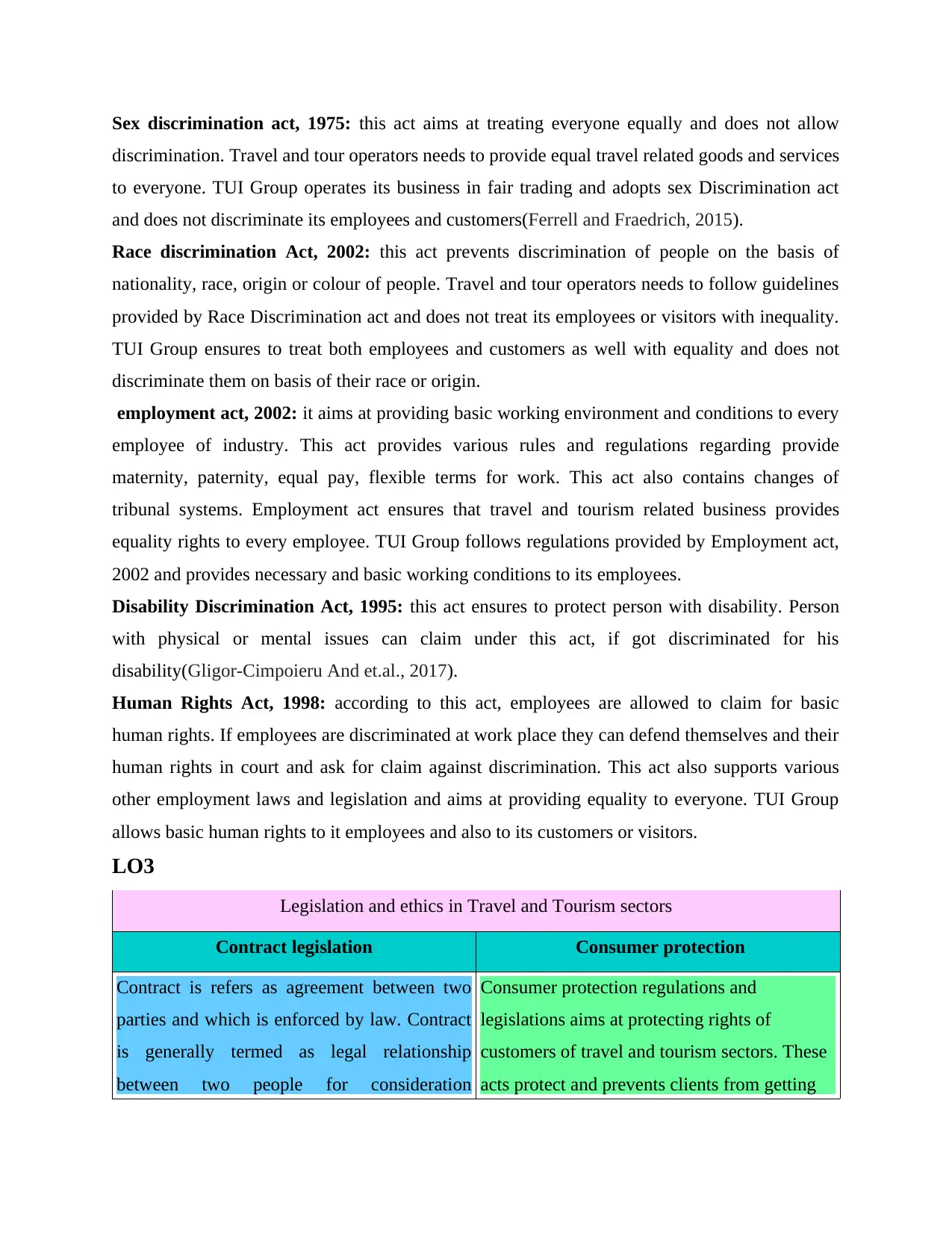
Sex discrimination act, 1975: this act aims at treating everyone equally and does not allow
discrimination. Travel and tour operators needs to provide equal travel related goods and services
to everyone. TUI Group operates its business in fair trading and adopts sex Discrimination act
and does not discriminate its employees and customers(Ferrell and Fraedrich, 2015).
Race discrimination Act, 2002: this act prevents discrimination of people on the basis of
nationality, race, origin or colour of people. Travel and tour operators needs to follow guidelines
provided by Race Discrimination act and does not treat its employees or visitors with inequality.
TUI Group ensures to treat both employees and customers as well with equality and does not
discriminate them on basis of their race or origin.
employment act, 2002: it aims at providing basic working environment and conditions to every
employee of industry. This act provides various rules and regulations regarding provide
maternity, paternity, equal pay, flexible terms for work. This act also contains changes of
tribunal systems. Employment act ensures that travel and tourism related business provides
equality rights to every employee. TUI Group follows regulations provided by Employment act,
2002 and provides necessary and basic working conditions to its employees.
Disability Discrimination Act, 1995: this act ensures to protect person with disability. Person
with physical or mental issues can claim under this act, if got discriminated for his
disability(Gligor-Cimpoieru And et.al., 2017).
Human Rights Act, 1998: according to this act, employees are allowed to claim for basic
human rights. If employees are discriminated at work place they can defend themselves and their
human rights in court and ask for claim against discrimination. This act also supports various
other employment laws and legislation and aims at providing equality to everyone. TUI Group
allows basic human rights to it employees and also to its customers or visitors.
LO3
Legislation and ethics in Travel and Tourism sectors
Contract legislation Consumer protection
Contract is refers as agreement between two
parties and which is enforced by law. Contract
is generally termed as legal relationship
between two people for consideration
Consumer protection regulations and
legislations aims at protecting rights of
customers of travel and tourism sectors. These
acts protect and prevents clients from getting
discrimination. Travel and tour operators needs to provide equal travel related goods and services
to everyone. TUI Group operates its business in fair trading and adopts sex Discrimination act
and does not discriminate its employees and customers(Ferrell and Fraedrich, 2015).
Race discrimination Act, 2002: this act prevents discrimination of people on the basis of
nationality, race, origin or colour of people. Travel and tour operators needs to follow guidelines
provided by Race Discrimination act and does not treat its employees or visitors with inequality.
TUI Group ensures to treat both employees and customers as well with equality and does not
discriminate them on basis of their race or origin.
employment act, 2002: it aims at providing basic working environment and conditions to every
employee of industry. This act provides various rules and regulations regarding provide
maternity, paternity, equal pay, flexible terms for work. This act also contains changes of
tribunal systems. Employment act ensures that travel and tourism related business provides
equality rights to every employee. TUI Group follows regulations provided by Employment act,
2002 and provides necessary and basic working conditions to its employees.
Disability Discrimination Act, 1995: this act ensures to protect person with disability. Person
with physical or mental issues can claim under this act, if got discriminated for his
disability(Gligor-Cimpoieru And et.al., 2017).
Human Rights Act, 1998: according to this act, employees are allowed to claim for basic
human rights. If employees are discriminated at work place they can defend themselves and their
human rights in court and ask for claim against discrimination. This act also supports various
other employment laws and legislation and aims at providing equality to everyone. TUI Group
allows basic human rights to it employees and also to its customers or visitors.
LO3
Legislation and ethics in Travel and Tourism sectors
Contract legislation Consumer protection
Contract is refers as agreement between two
parties and which is enforced by law. Contract
is generally termed as legal relationship
between two people for consideration
Consumer protection regulations and
legislations aims at protecting rights of
customers of travel and tourism sectors. These
acts protect and prevents clients from getting
⊘ This is a preview!⊘
Do you want full access?
Subscribe today to unlock all pages.

Trusted by 1+ million students worldwide
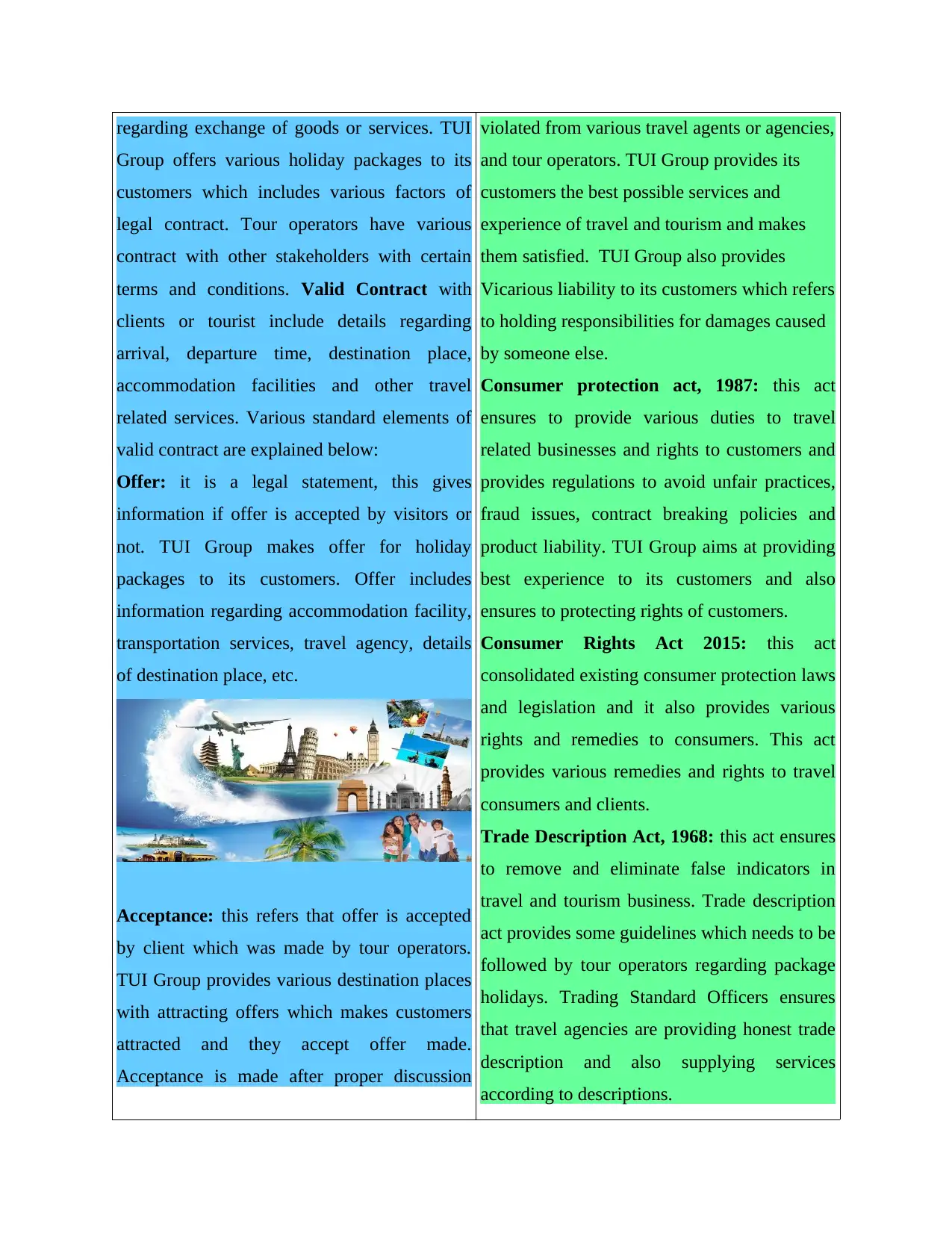
regarding exchange of goods or services. TUI
Group offers various holiday packages to its
customers which includes various factors of
legal contract. Tour operators have various
contract with other stakeholders with certain
terms and conditions. Valid Contract with
clients or tourist include details regarding
arrival, departure time, destination place,
accommodation facilities and other travel
related services. Various standard elements of
valid contract are explained below:
Offer: it is a legal statement, this gives
information if offer is accepted by visitors or
not. TUI Group makes offer for holiday
packages to its customers. Offer includes
information regarding accommodation facility,
transportation services, travel agency, details
of destination place, etc.
Acceptance: this refers that offer is accepted
by client which was made by tour operators.
TUI Group provides various destination places
with attracting offers which makes customers
attracted and they accept offer made.
Acceptance is made after proper discussion
violated from various travel agents or agencies,
and tour operators. TUI Group provides its
customers the best possible services and
experience of travel and tourism and makes
them satisfied. TUI Group also provides
Vicarious liability to its customers which refers
to holding responsibilities for damages caused
by someone else.
Consumer protection act, 1987: this act
ensures to provide various duties to travel
related businesses and rights to customers and
provides regulations to avoid unfair practices,
fraud issues, contract breaking policies and
product liability. TUI Group aims at providing
best experience to its customers and also
ensures to protecting rights of customers.
Consumer Rights Act 2015: this act
consolidated existing consumer protection laws
and legislation and it also provides various
rights and remedies to consumers. This act
provides various remedies and rights to travel
consumers and clients.
Trade Description Act, 1968: this act ensures
to remove and eliminate false indicators in
travel and tourism business. Trade description
act provides some guidelines which needs to be
followed by tour operators regarding package
holidays. Trading Standard Officers ensures
that travel agencies are providing honest trade
description and also supplying services
according to descriptions.
Group offers various holiday packages to its
customers which includes various factors of
legal contract. Tour operators have various
contract with other stakeholders with certain
terms and conditions. Valid Contract with
clients or tourist include details regarding
arrival, departure time, destination place,
accommodation facilities and other travel
related services. Various standard elements of
valid contract are explained below:
Offer: it is a legal statement, this gives
information if offer is accepted by visitors or
not. TUI Group makes offer for holiday
packages to its customers. Offer includes
information regarding accommodation facility,
transportation services, travel agency, details
of destination place, etc.
Acceptance: this refers that offer is accepted
by client which was made by tour operators.
TUI Group provides various destination places
with attracting offers which makes customers
attracted and they accept offer made.
Acceptance is made after proper discussion
violated from various travel agents or agencies,
and tour operators. TUI Group provides its
customers the best possible services and
experience of travel and tourism and makes
them satisfied. TUI Group also provides
Vicarious liability to its customers which refers
to holding responsibilities for damages caused
by someone else.
Consumer protection act, 1987: this act
ensures to provide various duties to travel
related businesses and rights to customers and
provides regulations to avoid unfair practices,
fraud issues, contract breaking policies and
product liability. TUI Group aims at providing
best experience to its customers and also
ensures to protecting rights of customers.
Consumer Rights Act 2015: this act
consolidated existing consumer protection laws
and legislation and it also provides various
rights and remedies to consumers. This act
provides various remedies and rights to travel
consumers and clients.
Trade Description Act, 1968: this act ensures
to remove and eliminate false indicators in
travel and tourism business. Trade description
act provides some guidelines which needs to be
followed by tour operators regarding package
holidays. Trading Standard Officers ensures
that travel agencies are providing honest trade
description and also supplying services
according to descriptions.
Paraphrase This Document
Need a fresh take? Get an instant paraphrase of this document with our AI Paraphraser
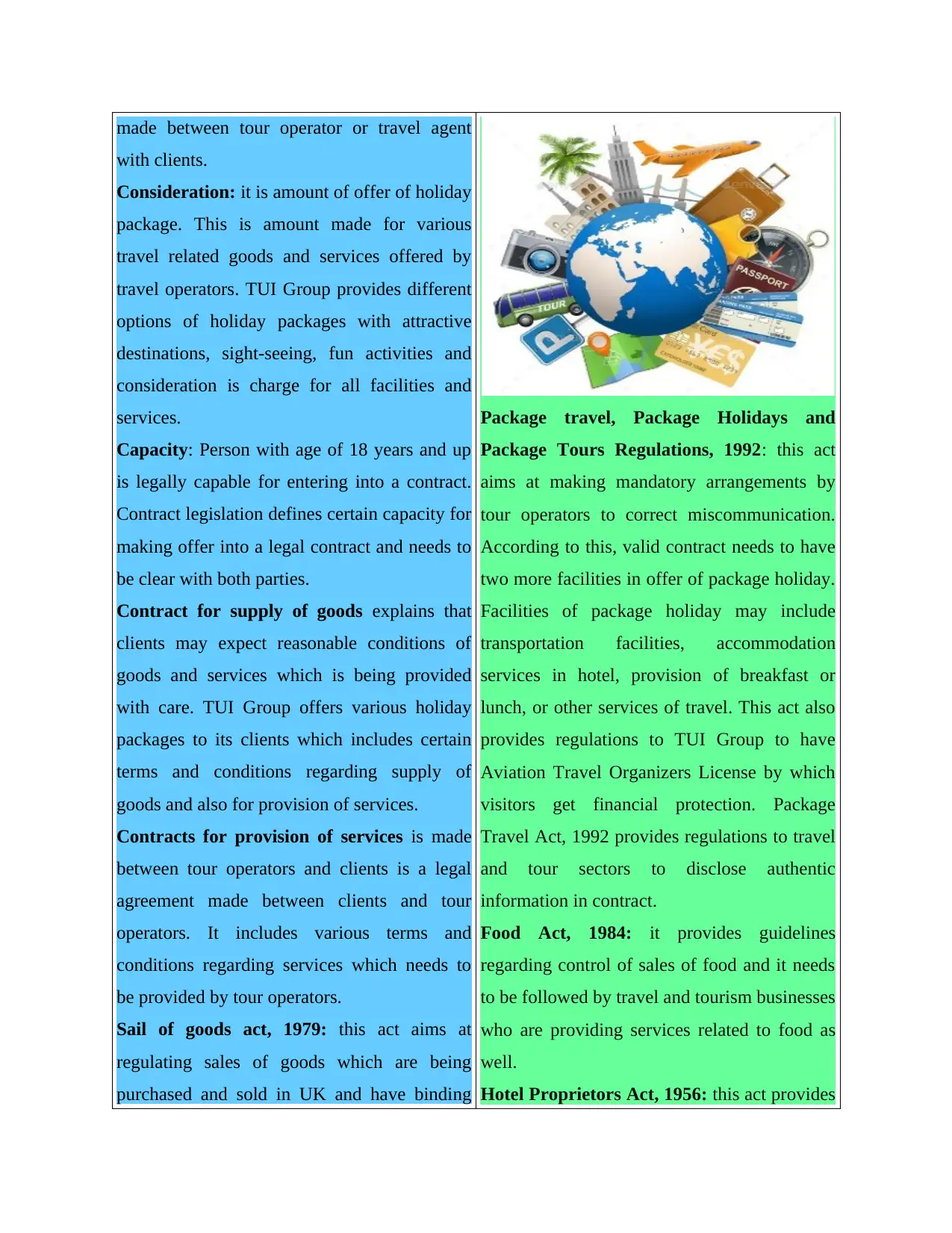
made between tour operator or travel agent
with clients.
Consideration: it is amount of offer of holiday
package. This is amount made for various
travel related goods and services offered by
travel operators. TUI Group provides different
options of holiday packages with attractive
destinations, sight-seeing, fun activities and
consideration is charge for all facilities and
services.
Capacity: Person with age of 18 years and up
is legally capable for entering into a contract.
Contract legislation defines certain capacity for
making offer into a legal contract and needs to
be clear with both parties.
Contract for supply of goods explains that
clients may expect reasonable conditions of
goods and services which is being provided
with care. TUI Group offers various holiday
packages to its clients which includes certain
terms and conditions regarding supply of
goods and also for provision of services.
Contracts for provision of services is made
between tour operators and clients is a legal
agreement made between clients and tour
operators. It includes various terms and
conditions regarding services which needs to
be provided by tour operators.
Sail of goods act, 1979: this act aims at
regulating sales of goods which are being
purchased and sold in UK and have binding
Package travel, Package Holidays and
Package Tours Regulations, 1992: this act
aims at making mandatory arrangements by
tour operators to correct miscommunication.
According to this, valid contract needs to have
two more facilities in offer of package holiday.
Facilities of package holiday may include
transportation facilities, accommodation
services in hotel, provision of breakfast or
lunch, or other services of travel. This act also
provides regulations to TUI Group to have
Aviation Travel Organizers License by which
visitors get financial protection. Package
Travel Act, 1992 provides regulations to travel
and tour sectors to disclose authentic
information in contract.
Food Act, 1984: it provides guidelines
regarding control of sales of food and it needs
to be followed by travel and tourism businesses
who are providing services related to food as
well.
Hotel Proprietors Act, 1956: this act provides
with clients.
Consideration: it is amount of offer of holiday
package. This is amount made for various
travel related goods and services offered by
travel operators. TUI Group provides different
options of holiday packages with attractive
destinations, sight-seeing, fun activities and
consideration is charge for all facilities and
services.
Capacity: Person with age of 18 years and up
is legally capable for entering into a contract.
Contract legislation defines certain capacity for
making offer into a legal contract and needs to
be clear with both parties.
Contract for supply of goods explains that
clients may expect reasonable conditions of
goods and services which is being provided
with care. TUI Group offers various holiday
packages to its clients which includes certain
terms and conditions regarding supply of
goods and also for provision of services.
Contracts for provision of services is made
between tour operators and clients is a legal
agreement made between clients and tour
operators. It includes various terms and
conditions regarding services which needs to
be provided by tour operators.
Sail of goods act, 1979: this act aims at
regulating sales of goods which are being
purchased and sold in UK and have binding
Package travel, Package Holidays and
Package Tours Regulations, 1992: this act
aims at making mandatory arrangements by
tour operators to correct miscommunication.
According to this, valid contract needs to have
two more facilities in offer of package holiday.
Facilities of package holiday may include
transportation facilities, accommodation
services in hotel, provision of breakfast or
lunch, or other services of travel. This act also
provides regulations to TUI Group to have
Aviation Travel Organizers License by which
visitors get financial protection. Package
Travel Act, 1992 provides regulations to travel
and tour sectors to disclose authentic
information in contract.
Food Act, 1984: it provides guidelines
regarding control of sales of food and it needs
to be followed by travel and tourism businesses
who are providing services related to food as
well.
Hotel Proprietors Act, 1956: this act provides
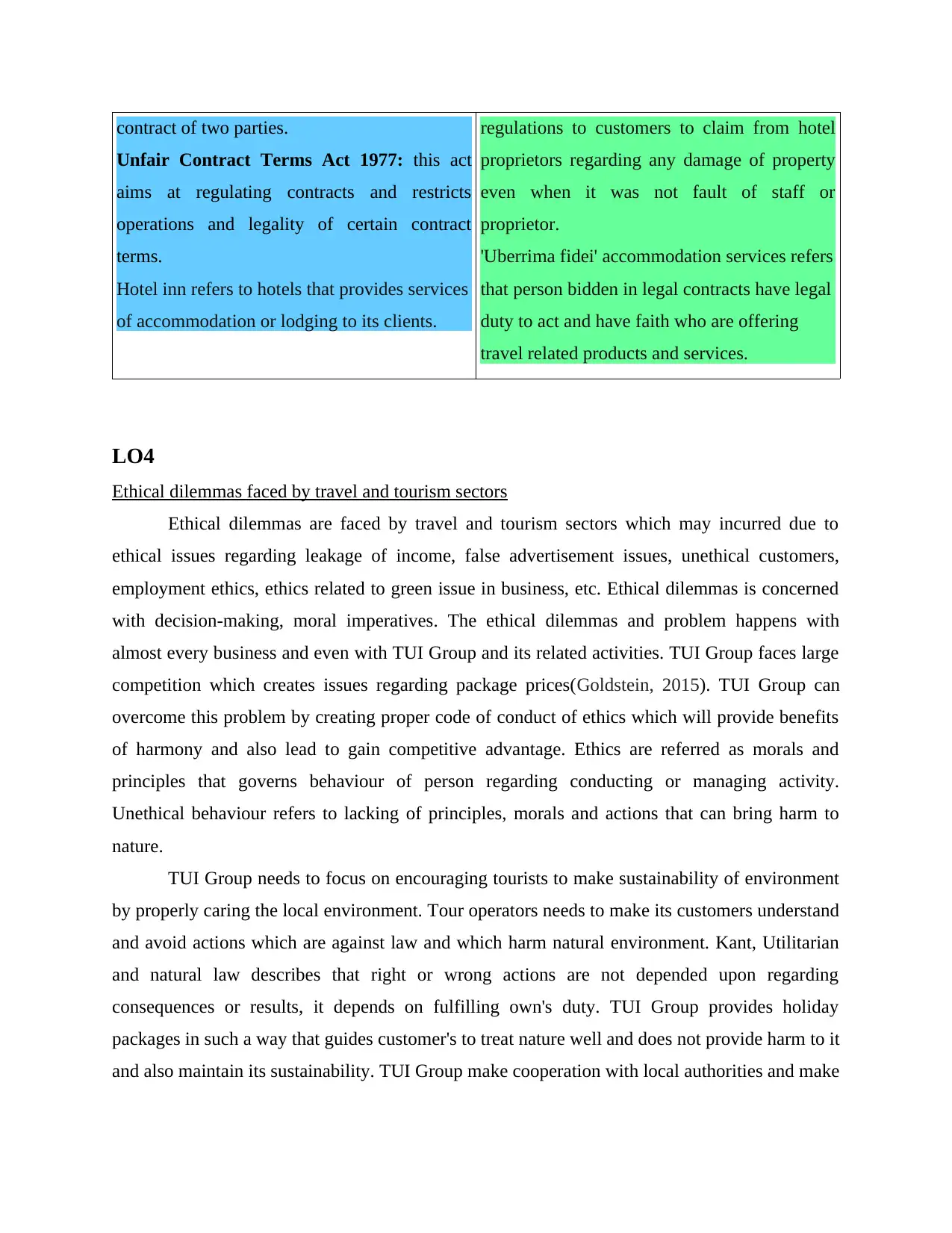
contract of two parties.
Unfair Contract Terms Act 1977: this act
aims at regulating contracts and restricts
operations and legality of certain contract
terms.
Hotel inn refers to hotels that provides services
of accommodation or lodging to its clients.
regulations to customers to claim from hotel
proprietors regarding any damage of property
even when it was not fault of staff or
proprietor.
'Uberrima fidei' accommodation services refers
that person bidden in legal contracts have legal
duty to act and have faith who are offering
travel related products and services.
LO4
Ethical dilemmas faced by travel and tourism sectors
Ethical dilemmas are faced by travel and tourism sectors which may incurred due to
ethical issues regarding leakage of income, false advertisement issues, unethical customers,
employment ethics, ethics related to green issue in business, etc. Ethical dilemmas is concerned
with decision-making, moral imperatives. The ethical dilemmas and problem happens with
almost every business and even with TUI Group and its related activities. TUI Group faces large
competition which creates issues regarding package prices(Goldstein, 2015). TUI Group can
overcome this problem by creating proper code of conduct of ethics which will provide benefits
of harmony and also lead to gain competitive advantage. Ethics are referred as morals and
principles that governs behaviour of person regarding conducting or managing activity.
Unethical behaviour refers to lacking of principles, morals and actions that can bring harm to
nature.
TUI Group needs to focus on encouraging tourists to make sustainability of environment
by properly caring the local environment. Tour operators needs to make its customers understand
and avoid actions which are against law and which harm natural environment. Kant, Utilitarian
and natural law describes that right or wrong actions are not depended upon regarding
consequences or results, it depends on fulfilling own's duty. TUI Group provides holiday
packages in such a way that guides customer's to treat nature well and does not provide harm to it
and also maintain its sustainability. TUI Group make cooperation with local authorities and make
Unfair Contract Terms Act 1977: this act
aims at regulating contracts and restricts
operations and legality of certain contract
terms.
Hotel inn refers to hotels that provides services
of accommodation or lodging to its clients.
regulations to customers to claim from hotel
proprietors regarding any damage of property
even when it was not fault of staff or
proprietor.
'Uberrima fidei' accommodation services refers
that person bidden in legal contracts have legal
duty to act and have faith who are offering
travel related products and services.
LO4
Ethical dilemmas faced by travel and tourism sectors
Ethical dilemmas are faced by travel and tourism sectors which may incurred due to
ethical issues regarding leakage of income, false advertisement issues, unethical customers,
employment ethics, ethics related to green issue in business, etc. Ethical dilemmas is concerned
with decision-making, moral imperatives. The ethical dilemmas and problem happens with
almost every business and even with TUI Group and its related activities. TUI Group faces large
competition which creates issues regarding package prices(Goldstein, 2015). TUI Group can
overcome this problem by creating proper code of conduct of ethics which will provide benefits
of harmony and also lead to gain competitive advantage. Ethics are referred as morals and
principles that governs behaviour of person regarding conducting or managing activity.
Unethical behaviour refers to lacking of principles, morals and actions that can bring harm to
nature.
TUI Group needs to focus on encouraging tourists to make sustainability of environment
by properly caring the local environment. Tour operators needs to make its customers understand
and avoid actions which are against law and which harm natural environment. Kant, Utilitarian
and natural law describes that right or wrong actions are not depended upon regarding
consequences or results, it depends on fulfilling own's duty. TUI Group provides holiday
packages in such a way that guides customer's to treat nature well and does not provide harm to it
and also maintain its sustainability. TUI Group make cooperation with local authorities and make
⊘ This is a preview!⊘
Do you want full access?
Subscribe today to unlock all pages.

Trusted by 1+ million students worldwide
1 out of 15
Related Documents
Your All-in-One AI-Powered Toolkit for Academic Success.
+13062052269
info@desklib.com
Available 24*7 on WhatsApp / Email
![[object Object]](/_next/static/media/star-bottom.7253800d.svg)
Unlock your academic potential
Copyright © 2020–2026 A2Z Services. All Rights Reserved. Developed and managed by ZUCOL.





